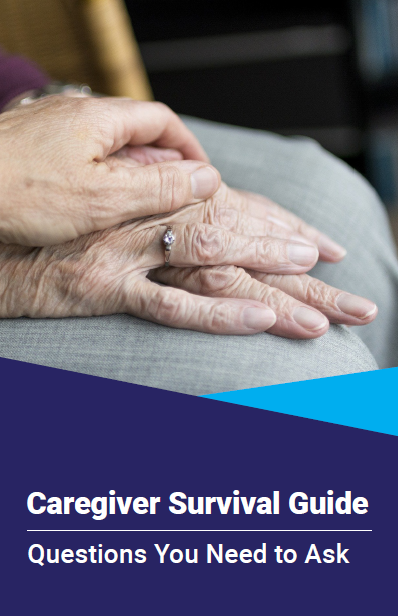Created by the Older Adult Advisory Committee of Ajax Public Library, part of the Town of Ajax's Age Friendly initiative.
A PDF of Caregiver Survival Guide is available. Print copies can be provided by visiting any branch of Ajax Public Library or contacting the Coordinator of Marketing and Communications.
How to use this Guide
When preparing this guide, we devised questions for three (3) stages of caregiving: planning, diagnosis, and contingency. Advanced planning provides an opportunity for each person to make decisions and empowers the caregiver. Questions to ask after a diagnosis focus on the caregiver gathering information to inform day to day decisions including emergencies. Contingency questions centre on next steps should alternative care be needed including formal care plans, long term care, and personal support workers. Questions were tailored to be asked at each stage with the understanding that answers will change based on your current situation.
We hope this guide will help you. It was written as a starting point for each stage of caregiving. Not only will these questions lead to answers, but they will also help you plan: a good way to reduce stress for you as a caregiver and your loved one.
Who was this Guide written for?
At some stage in your life, you will either provide or require care. Dealing with medical professionals and support agencies can be frightening, stressful, and overwhelming. The trick is to know what questions to ask. This guide was written by the Ajax Public Library’s Older Adult Advisory Committee: people like you who found themselves in that situation, who struggled and who are still discovering new questions. We hope that sharing our questions will help you get the answers you need to provide the level of care that is important to you. Feel free to share this guide with friends and family plus your medical professionals. All will benefit from knowing what type of questions you need answered during your caregiving journey.
Medical Care Planning
Ask these questions to your doctors, specialists, nurses, or other medical adjacent professionals.
- When should I/we be concerned?
- Who should I/we discuss medical questions and answers with?
- family doctor
- family members
- specialists
- friends
- How much time do I have?
- How does the condition progress?
- What are the options for treatment and care?
- Where will care be provided?
- Where can I/we go for more information?
- How do I create a care plan? See Care Plan Questions for more ideas.
- What should I/we discuss with each doctor?
- Who else needs to know? i.e. Neighbours, faith organizations, clubs, etc.
- When do I/we need external help to remain at home?
- When do we need to start planning for long term care? See Long Term Care questions.
- What palliative care options are available and how/when should they be accessed?
- Are there people who will block me from getting or giving information? Who are they and how do I/we work with them?
- How do I/we let my friends and family support me?
- What support services and equipment will be required?
- What does our pharmacy need to know and what help can they provide? i.e. Pill packs, etc.
- What is the difference between a physical and occupational therapist?
- What do I do when the person I am caring for doesn’t want to talk about things?
- What questions should I take to medical appointments and how should I track the answers?
- What supports does the hospital offer? i.e. MyChart to access medical records, patient emails, etc.
- Are there specialty clinics or programs that can help with support? i.e. Geriatric Assessment and Intervention Network Clinic, foot care, dental clinics, etc.
On a personal note: Who can I talk to about how I feel, especially if I’m experiencing burnout and/or depression?
Financial
- What long-term funeral plans should we discuss and/or put into place?
- How do we pay for equipment, support agencies, drugs, tests, and treatments?
- Above and beyond health-related issues, what else do I need to handle? i.e. Paying bills or taxes, banking, investments, etc.
- What financial supports, benefits, and leaves are available to caregivers?
- What documents will I need to complete financial transactions? i.e. Power of Attorney for Finance, medical expense forms, pre-authorized debit, etc.
- Where will care be provided? What support services and equipment will be required?
Legal
- What is a living will and why is it important?
- When should I make a living will?
- What types of different wills exist, and which is right for me?
- What are the different types of Power of Attorneys and why are they important?
- What do we need to know about MAID (medical assistance in dying)?
- Why do I need a list of social media accounts and what authorizations need to be activated?
- Is there an up-to-date copy of the will and who is the executor?
- How do I proceed with notifications for banks, government agencies, etc., including bill payments and taxes?
- Who else needs to be notified?
- What is a substitute decision maker?
- What do I need to know about Health Privacy and Consent?
Security
- How do I protect my care receiver’s privacy?
- Should we install a lockbox outside so that emergency services or others could get in?
- Are there other security issues that could arise?
- Should we have monitored smoke detectors and door monitors?
- Should we invest in a fall detector or a GPS tracker?
- Who can help with a safety home assessment and equipment? i.e. Handrails on stairs, locks on medicine cabinets, shower chairs, bed lifts, etc.
- Does it make sense to downsize?
- Is my mobility equipment safe?
Services
- When do we need to start planning for long term care?
- How do we get a doctor if I need a family doctor or specialist?
- How do I get a caregiver?
- What agencies can provide help or support?
- What do I do if I can’t get to the mailbox?
- How can grocery deliver help?
- What are subscription orders and how would they help me?
- What external programs are available that could help people with dementia and how do I find them? For example, social or exercise programs, or caregiver programs for me.
- What other community-based services are available?
- Who can help?
- Where can we get foot care?
- Will the Library deliver books and other media to me?
Emergency Planning
- Am I prepared for an emergency?
- Is there anything to do before help arrives?
- What quick access information is needed? i.e. Health card, medications, lists of doctors, appointments, contacts, Power of Attorney, living will documents, etc.
- How do I assemble quick access information? i.e. Pharmacy list for current medications.
- What shouldn’t go to the hospital?
- Who will take care of children or animals?
- Do I have a contingency plan in the event I cannot take care of my care receiver?
Helpful Hints:
- Keep information in a clear bag close to your front door. It should be visible.
- Carry a copy of the information with you whenever you go out.
- Store all important documents in one place.
- If you have a contingency plan, follow it and make sure the back-up caregiver has all the necessary information.
- Make use of the Ontario Caregiver Organization Contingency and Emergency Planning Toolkit.
Care Plan
- What is a care plan and why do I need one?
- How do I make one and who should be involved in creating it?
- What technologies could I use and who needs a copy?
- What do I need to know about medications?
- When are they taken?
- When does each prescription need to be renewed?
- Can the pharmacist renew each or does it require the doctor and who arranges that?
- Any special conditions, such as take with food or don’t take within # hours of eating, etc.
- How do I keep track of medications, medical appointments, and tests within the plan?
- How do I know whether my care recipient is taking all his or her medications on time?
- What are subscription orders and how would they help me?
- What transportation supports are available to get medical or other appointments?
- What do I need to know about doctor ordered tests?
Long Term Care
- When do we need to plan for long-term care and how do we do that?
- Who is eligible for long term care and who makes that decision?
- How long does it take to get a long-term care bed?
- How do you select a home?
- What happens if things change and you need a bed before your name comes up on the list?
- What happens if your name comes up and you don’t want to accept the placement?
- How do I advocate for my care recipient and who should I speak to if I have concerns?
- What will the long term care staff expect from me?
Personal Support Workers (PSWs)
- What is a PSW? What assistance can they offer to support care?
- How does the application, payment, and scheduling process work for PSWs?
- What do I need to know about scheduling a PSW and what are my rights when they are onsite?
- What is the difference between a PSW and palliative care?
Supporting Agencies
Discover agencies which support care and caregivers by:
- Searching www.211.ca, Canada’s primary source of information for government and community-based, non-clinical health and social services.
- Reviewing the Ontario Guide for Family and Caregivers created by the Government of Ontario covering federal and provincial information.
- Reaching out to the Ontario Caregiver Organization
- Access the Age-Friendly Ajax Community Resources Guide from the Town of Ajax
- Ontario Health atHome coordinates local home and community care, and long-term care placement.


